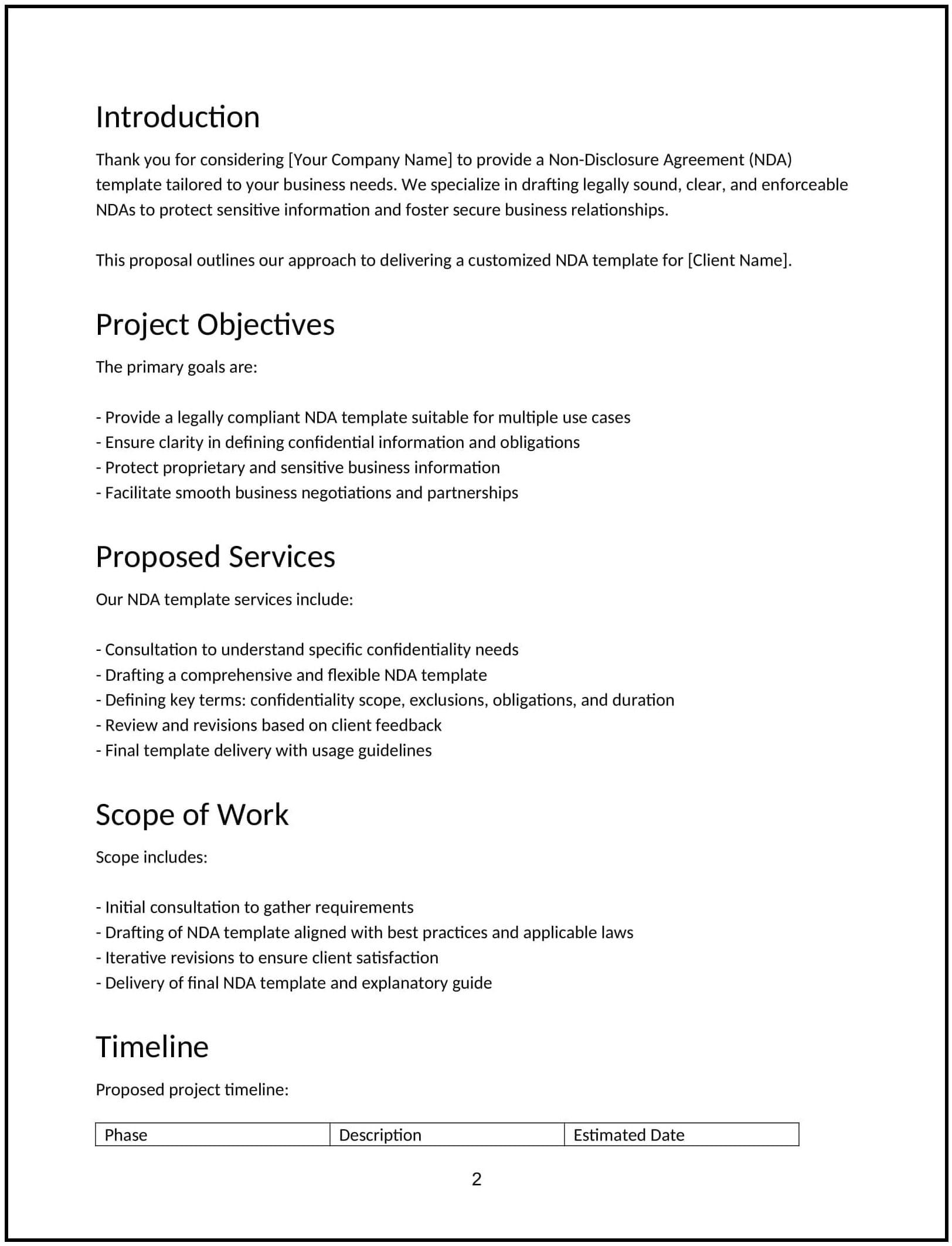Non-disclosure agreement template proposal: Free template
Got contracts to review? While you're here for proposals, let Cobrief make contract review effortless—start your free review now.

Customize this template for free
Customize this free non-disclosure agreement template proposal with Cobrief
Open this free non-disclosure agreement (NDA) template proposal in Cobrief and start editing it instantly using AI. You can adjust the tone, structure, and content based on your client’s industry, deal context, and confidentiality concerns. You can also use AI to review your draft — catch vague terms, clarify protections, and tighten legal language before sending.
Once you're done, send, download, or save the proposal in one click — no formatting or setup required.
This template is fully customizable and built for real-world use — ideal for clients who routinely share sensitive business information during deals, partnerships, fundraising, or hiring. Whether you're delivering this as part of a legal retainer or as a one-off engagement, this proposal helps you clearly define your offering and close work faster.
What is a non-disclosure agreement template proposal?
A non-disclosure agreement (NDA) template proposal outlines how you’ll provide or customize an NDA template for a client’s specific use cases — such as investor conversations, employee onboarding, or vendor negotiations. It typically includes scope of work, legal review, template format, optional variants, and pricing.
This proposal is used by lawyers, legal consultants, and compliance professionals working with startups, agencies, and growing businesses. It may also serve as a bundled deliverable within broader legal toolkits.
Unlike contract drafting or negotiation proposals, this one is focused on creating a standardized, reusable NDA template — often with light customization or guidance.
Why use Cobrief to edit your proposal
- Edit the full proposal instantly: Skip formatting tools — open and customize it in-browser.
- Use AI to tailor tone and scope: Adjust for one-way vs. mutual NDAs, industry norms, or specific client concerns.
- Run a full AI-powered review: Spot unclear clauses, scope gaps, or missing sections before sending.
- Apply suggestions in one click: Accept edits individually or apply all at once.
- Save, send, or download: Export a professional proposal in seconds.
When to use this proposal
- When delivering a custom NDA template to a startup or growing company
- When responding to a request for a reusable one-way or mutual NDA
- When including NDA support as part of a broader commercial toolkit
- When helping a client prepare for fundraising, partnership discussions, or hiring
- When improving or replacing a legacy NDA that no longer reflects the business’s needs
What to include in a non-disclosure agreement template proposal
- Project overview: Describe the purpose of the NDA template — such as protecting sensitive information during deals, interviews, or collaborations. Tailor this to the client’s most common use cases.
- Scope of work: List what you’ll provide — such as a one-way or mutual NDA template, optional clause variants, plain-English guidance, and brief onboarding support. Clarify if multiple versions or jurisdictions are included.
- Timeline: Provide a clear delivery schedule — typically from kickoff to draft delivery and one round of edits. Include time for client review or feedback.
- Deliverables: Specify what the client will receive — a finalized NDA template (Word or PDF), annotated guidance, optional clause library, and brief usage instructions.
- Pricing: Present your fee clearly — flat rate for the template or tiered pricing for multiple formats or jurisdictions. Note what’s included and whether future updates are covered.
- Call to action / next steps: Close with a clear next step — approve the proposal, confirm key use cases, or schedule a kickoff call. Keep it clear and easy to act on.
How to write an effective non-disclosure agreement template proposal
- Focus on reusability: Emphasize that this is a plug-and-play tool for recurring business scenarios.
- Speak in plain-English: Make the proposal clear to founders or operators who may not be legally trained.
- Define boundaries: Be specific about what’s included — this is not a full negotiation service.
- Match to their risk profile: Tailor scope based on the type of data, relationships, and jurisdictions involved.
- Keep it simple and fast: NDAs are often time-sensitive — your proposal should feel quick and actionable.
- End with clarity: Always close with a confident CTA that reduces friction.